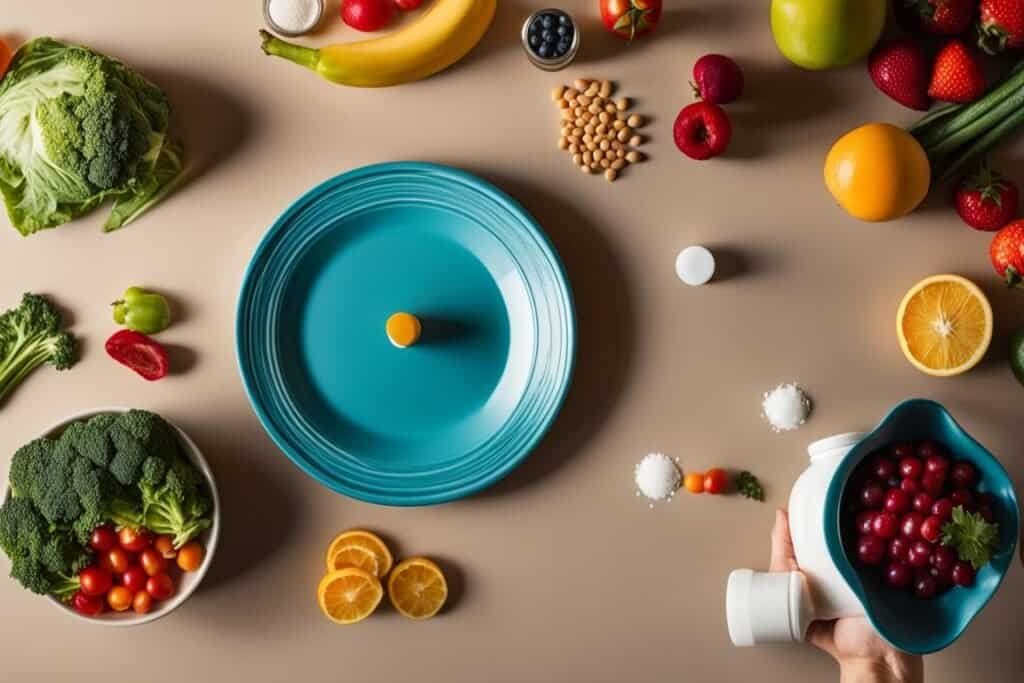Cholesterol and salt are often topics of concern when it comes to maintaining a healthy lifestyle. There are numerous myths surrounding their relationship, which can make it challenging to make informed decisions about your diet. By separating fact from fiction, you can gain a clearer understanding of how cholesterol and salt affect your health.
Throughout this article, we will debunk common misconceptions and provide you with the facts you need to make educated choices about your diet. Let’s explore the truth about cholesterol and salt intake and how you can maintain a healthy balance.
Key Takeaways:
- Cholesterol and salt are important factors to consider for a healthy lifestyle.
- Separate myths from facts to make informed decisions about your diet.
- Both sea salt and table salt contribute to high cholesterol and blood pressure when consumed in excess.
- Dietary cholesterol from egg yolks does not significantly impact overall cholesterol levels.
- Include vitamin C-rich foods like papaya and strawberries in your diet as alternatives to oranges.
The Myth of Sea Salt vs. Table Salt
Many people believe that sea salt is a healthier alternative to table salt because it contains additional minerals like iron and magnesium. However, both sea salt and table salt have approximately the same amount of sodium per teaspoon, which can contribute to high cholesterol and blood pressure when consumed in excess. It is important to reduce your intake of both types of salt to maintain a healthy diet.
Reducing your cholesterol and salt intake is essential for maintaining good overall health. High cholesterol levels can increase the risk of heart disease and other cardiovascular conditions, while excessive salt consumption can lead to high blood pressure. By making simple changes to your diet, you can effectively manage these risks.
When it comes to salt, it is crucial to be mindful of your intake, regardless of the type. While sea salt may have some additional minerals, it still contains sodium, which can have negative effects on your health if consumed in excess. Aim to limit your intake of all types of salt and opt for natural flavor enhancers like herbs and spices instead.
Here are some practical tips to help you reduce your cholesterol and salt intake:
- Choose fresh, whole foods over processed and packaged ones, as they are often high in added salt and unhealthy fats.
- Read food labels carefully and choose low-sodium or reduced-sodium options when available.
- Cook meals at home using fresh ingredients, so you have control over the amount of salt added.
- Experiment with different herbs and spices to add flavor to your dishes without relying on salt.
- Include more fruits, vegetables, whole grains, and lean proteins in your diet, as they are naturally low in cholesterol and sodium.
- Limit your consumption of processed meats, fried foods, and baked goods, as they are often high in both cholesterol and salt.
- Stay hydrated by drinking plenty of water, as it can help flush out excess sodium from your body.
By making small changes to your eating habits and being mindful of the cholesterol and salt content in your diet, you can take control of your health and reduce the risk of cardiovascular diseases. Remember, moderation is key, and consulting with a healthcare professional or registered dietitian can provide personalized guidance.

Dispelling the Myth of Egg Yolks and Cholesterol
There is a common misconception that consuming egg yolks raises cholesterol levels in the body. However, research has shown that dietary cholesterol from eggs does not significantly impact serum cholesterol levels. In fact, eggs can be a part of a balanced diet and may even help reduce calorie intake throughout the day. It is important to focus on overall cholesterol and salt balance in your diet, rather than eliminating specific foods.

Eggs are an excellent source of protein, vitamins, and minerals. They provide essential nutrients like vitamin D, choline, and selenium, which are vital for various bodily functions.
While eggs do contain cholesterol, studies have found that the cholesterol in food has little impact on blood cholesterol levels for most people. In fact, dietary cholesterol has less of an effect on cholesterol levels than saturated and trans fats. Therefore, managing cholesterol and salt levels is not just about restricting egg yolks but also making healthy choices in your overall diet.
Eggs can be consumed as part of a balanced diet that includes other nutrient-rich foods such as fruits, vegetables, whole grains, and lean proteins. By focusing on a variety of wholesome choices and managing portion sizes, you can maintain a healthy cholesterol and salt balance.
It is essential to consult with a healthcare professional or a registered dietitian to understand your specific dietary needs. They can provide personalized guidance on managing cholesterol and salt levels while ensuring that you receive all the necessary nutrients for overall health and well-being.
The Truth About Vitamin C and Oranges
When it comes to vitamin C, oranges have always been hailed as the go-to source. However, there are other healthy alternatives that pack an even higher nutrient punch while helping you lower your cholesterol and salt intake. Including these foods in your diet can provide a balanced intake of nutrients and a flavorful twist to your meals.
Papaya: Did you know that papaya contains more vitamin C per calorie than oranges? This tropical fruit is rich in antioxidants and can help boost your immune system while adding a touch of sweetness to your plate.
Brussels Sprouts: These tiny green gems are not only delicious but also a fantastic source of vitamin C. Just half a cup of cooked Brussels sprouts provides more than the recommended daily amount. Roast them with a sprinkle of sea salt and olive oil for a healthy side dish.
Strawberries: Bursting with flavor, strawberries are not only a tasty treat but also a great source of vitamin C. One cup of strawberries contains more vitamin C than an orange, making them an excellent choice to satisfy your sweet tooth without compromising your cholesterol and salt levels.
By incorporating these healthy alternatives into your diet, you can enjoy the benefits of vitamin C while reducing your reliance on cholesterol and salt-rich foods. Remember, a balanced intake of nutrients is key to a healthy lifestyle.
| Food | Vitamin C Content (per 100g) |
|---|---|
| Oranges | 53.2mg |
| Papaya | 60.9mg |
| Brussels Sprouts | 85mg |
| Strawberries | 59.1mg |
Debunking the Myth of Unlimited Healthy Food Consumption
While it is important to eat a balanced and nutritious diet, it is crucial to understand the dangers of excessive cholesterol and salt consumption. Even though certain foods are considered healthy, it is essential to practice moderation and follow nutritional guidelines for cholesterol and salt control.
Overeating, even with healthy foods, can lead to weight gain and other health issues. Consuming excessive amounts of cholesterol and salt can contribute to high blood pressure, cardiovascular problems, and other complications. It is important to be mindful of your overall intake to maintain a healthy lifestyle.
When planning your meals, keep in mind the recommended daily limits for cholesterol and salt consumption. The American Heart Association suggests limiting cholesterol intake to less than 300 milligrams per day, while the daily recommended sodium intake should be less than 2,300 milligrams for most adults. These guidelines help prevent the negative effects of excessive cholesterol and salt in your diet.
While incorporating a variety of nutrient-rich foods, such as fruits, vegetables, lean proteins, and whole grains, it is important to pay attention to portion control. Your plate should primarily consist of foods low in cholesterol and salt, ensuring a well-balanced meal.
Remember, even healthy foods can contribute to excessive cholesterol and salt intake if consumed in large quantities. By following nutritional guidelines and practicing portion control, you can maintain a healthy lifestyle and reduce the risks associated with excessive cholesterol and salt consumption.
Keep in mind that everyone’s dietary needs are different, so consulting with a healthcare professional or a registered dietitian can provide personalized guidance and help you design a plan that suits your specific needs and goals.
Conclusion
Cholesterol and salt play crucial roles in maintaining a healthy lifestyle. Understanding the correlation between these factors is key to making informed decisions about your diet. By focusing on achieving an overall cholesterol and salt balance, you can promote better health and well-being.
It is important to remember that while some myths exist about the impact of cholesterol and salt on our bodies, it is best to rely on scientific facts. Consulting with a healthcare professional can provide personalized guidance tailored to your specific needs.
By incorporating these practices into your lifestyle, you can take control of your cholesterol and salt intake and work towards a healthier future. Remember, small changes in your diet, such as opting for healthier alternatives and practicing portion control, can make a big difference in your overall well-being.
Stay informed, stay mindful, and prioritize your health by staying conscious of the correlation between cholesterol and salt. Together, let’s make smart choices to promote a balanced and healthy lifestyle.

